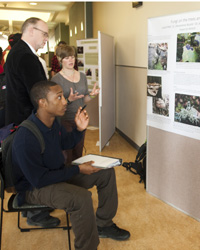‘Transformations’ Spotlights Student Scholars

04/15/2014
SUNY Cortland will continue to spotlight student academics with “Transformations: A Student Research and Creativity Conference,” featuring dozens of student presentations and two poster sessions on Friday, April 25.
The 18th annual event takes place from 12:30 to 5:30 p.m. in Sperry Center. Regular classes across campus will be in session as scheduled during the conference. The event is free and open to the public. Complimentary refreshments will be served for a portion of the afternoon in the Sperry Center first-floor food service area.
“The annual ‘Transformations’ conference is one of the highlights of the academic year at SUNY Cortland,” said Bruce Mattingly, dean of arts and sciences and Transformations Committee chair. “It is a day where students and faculty from all over the college come together to share the excitement of their scholarly and creative activities with one another.
“It is truly a day of building community and raising awareness about the marvelous research opportunities that are available to students in all departments.”
In 2011, a special planning committee renamed and reorganized the then 15-year-old event called Scholars’ Day to reflect the College’s strategic priorities, which also include academic excellence. As revised, the 18th annual event will focus on student work but also will feature faculty who have worked with students as research mentors. In fact, such partnerships between professors and students majoring in their disciplines are a fairly common practice at the College so a strong faculty presence is certain.
This year, the conference encompasses nearly 60 different lectures, demonstrations and poster sessions offered by undergraduate and graduate students with their faculty mentors. The subject matter covers a wide array of academic disciplines at SUNY Cortland.
Among the many topics this year are: “The EU and Economic Policy on a Global Scale: The Challenge of China”; “A Comparison of Annual Ring Growth, Vessel Element Density and Stomata Density of Black (Betula lenta) and Yellow (Betula alleghaniensis) Birches”; “Cosmetics with Botanical Extracts”; “Unraveling a Mayan Mystery: Analysis of Raw vs. Fired Clay Body Samples from Belize”; “Foam Rolling and Stretching’s Effect on Acute Range of Motion”; “Sensory Integration/Motor Sensory Movement Exploration Center Single-Subject Research”; “Effect of Stress and Aggression on the Injury Rate within Collegiate Lacrosse Players”; “An Investigation of Yoga, Cognitive and Somatic Anxiety, and Cognitive Functioning”; “Voter Suppression: American Democracy at Risk?”; “Measurements of Atmospheric Carbon Dioxide in Cortland County Air”; and presentations by the SUNY Cortland writing contest award winners.
Gary S. Kleppel ’73, a professor of biological sciences and director of the graduate program in biodiversity, conservation and policy at the University at Albany, delivers the conference’s keynote address at 12:30 p.m. Although he was trained initially as a marine biologist, Kleppel’s research interests are far-reaching and include topics such as sustainable agriculture and the ecology of human-dominated landscapes. His talk is titled “Multidisciplinary Solutions to 21st Century Environmental Challenges: Lessons from Sustainable Agriculture and Conservation Grazing.”
“Serious environmental challenges, many of them arising from human domination of the Earth’s ecosystems and the misuse of natural capital, threaten our way of life and even our life support systems,” Kleppel suggests. “These great challenges will not be resolved by practitioners within a single discipline. Rather, solutions will come from collaborations across a vast array of disciplines.”
A change is occurring in the way food is produced and marketed in the United States, Kleppel points out. Experiences in sustainable agriculture and conservation grazing could provide suitable examples of a suitable interdisciplinary approach.
Kleppel certainly has shared those experiences. For more than a decade, he and his wife have operated Longfield Farm, a relatively small operation located just west of Albany. There, they produce grass-fed lamb, wool, free-range poultry and eggs, and artisan breads. They rely entirely on sustainable methods for food production — energy is provided by photovoltaics, pastures are managed to enhance soil health and biodiversity, and livestock are treated humanely — in a way that does not threaten the ecological integrity of the landscape.
Kleppel is author of nearly 100 papers, books and technical reports. His upcoming volume, The Emergent Agriculture: Farming, Sustainability and the Return of the Local Economy, will be published this summer.
Prior to his jump into sustainable agriculture, Kleppel conducted his postdoctoral work in oceanography. His research on the ocean’s food webs spanned nearly two decades and in 1994 he was appointed chief scientist for the National Oceanic and Atmospheric Administration’s Land-Use Coastal Ecosystem Study, which sought to understand how suburban development in the Southeast would affect coastal ecosystems. That study led Kleppel to focus more on land use.
After receiving a bachelor’s degree from SUNY Cortland, Kleppel earned his Ph.D. in biology from Fordham University in 1979, specializing in marine ecology.
Besides Mattingly, the Transformations Committee includes: Martine Barnaby, associate professor of art and art history; Phil Buckenmeyer, associate professor and chair of kinesiology; Patricia Conklin, associate professor of biological sciences; Daniel Harms, associate librarian at Memorial Library; David Miller, distinguished teaching professor of geography; Lisa Mostert, media operations associate with Campus Technology Services; Charlotte Pass, associate professor of literacy; and Kevin Pristash, associate director of college union and conferences.
“Transformations” is supported by the President’s Office, the Provost and Vice President for Academic Affairs Office and the Auxiliary Services Corporation. The Student Alumni Association provides volunteers for “Transformations.”
For more information, including the complete schedule of events, visit the “Transformations” Web page or contact Mattingly at 607-753-4312.

